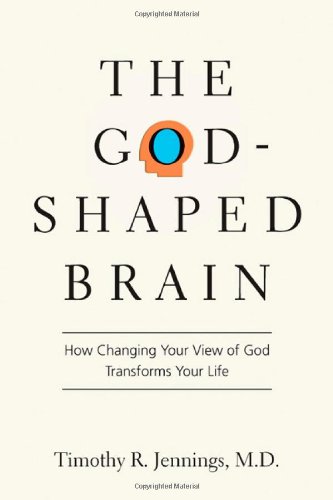The God-Shaped Brain: How Changing Your View of God Transforms Your Life
Written by Timothy R. Jennings Reviewed By John S. LeonardIn The God-Shaped Brain, Timothy R. Jennings, M.D., claims that our view of God affects the health of our brain. If we embrace a “love-based God concept,” we will have a healthier mind. If we embrace a “fear-based God concept,” our actions become selfish, and the brain is actually damaged.
With accessible language Jennings explains that when we are afraid we go into a flight or fight mode, which activates certain parts of the brain and shuts down others. The more we are in that state of mind, the more our brain adopts a pattern of response that damages our brains and produces anxiety, depression, stress, and selfishness. What causes this permanent fear response is believing that God should be feared because he is filled with wrath, eager to cast us into hell for our sin.
This fear-fueled anxiety can be corrected by believing in a loving God, a God who delights not in punishing us but in healing us. Embracing a loving God activates other areas of the brain that calms the flight or fight area of the brain, restoring balance and health to the brain.
Certain insights into how the brain functions will prove illuminating to pastors and counselors today. Jennings shows, for example, how 15 minutes of prayer builds healthy brain patterns. He cites studies that prove how certain content, when it stimulates the entertainment part of the brain, increases violence even if the content is not violent. Jennings also explains how Eastern meditation affects the brain, throwing it out of balance to produce a euphoric state. He further defends biblical meditation that engages the mind and balances brain function.
All this is good and useful so far as it goes. The trouble, however, is that The God-Shaped Brain is not based on a sound theology. Jennings uses a defective hermeneutic that he calls “Integrative Evidence-Based Approach,” composed of three parts: Scripture, God’s law in science and nature, and human experience. Although Jennings claims that these are submitted to the Holy Spirit, he ignores the entire teaching of Scripture on the nature of God. He is only interested in understanding God as a God of love.
One example of his mistaken and forced interpretation of Scripture is when he cites Christ speaking of the dead as having fallen asleep to the effect that God never put anyone to death in the OT (but only put them to sleep). Another example of an unwillingness to submit to the whole counsel of God in Scripture is that according to Jennings the death of Christ is not propitiatory. God’s wrath does not need to be satisfied. A loving God, after all, requires no payment of sin. Those who are outside of Christ are annihilated upon death, not punished for eternity in hell. All this is an inadequate view of God that does not appropriate the many varied strands of biblical teaching, such as the truth that God is a God of both righteous wrath and unspeakable love. Also, sin seems to be confined to wrong thinking in the brain; salvation is thinking correctly about God. Finally, The God-Shaped Brain oversimplifies the complexity of what it means to be created in the image of God. One gets the impression that we are nothing more than physical beings. Dr Jennings refers to the soul only once.
Although I cannot recommend this book because of its unorthodox positions, it does hold some important insights worth pondering by evangelical pastors and counselors.
John S. Leonard
John S. Leonard
Westminster Theological Seminary
Philadelphia, Pennsylvania, USA
Other Articles in this Issue
I don’t want to give the impression that I’m a prayer-expert...
In 1983 the Christian social critic Os Guinness commented, ‘Christians are always more culturally shortsighted than they realise...
The Ministerial Ideal in the Ordination Sermons of Jonathan Edwards: Four Theological Portraits
by Robert CaldwellAs Jonathan Edwards’s reputation for defending moderate New Light revivalism grew in the 1740s, others increasingly sought him to preside over the ordination of ministers in nearby churches...
The nineteenth-century Scottish Presbyterian theologian William Symington wrote concerning Christ’s intercession, “in a practical and consolatory point of view, its interest is not exceeded even by the Atonement...
Does someone have the right to harm their own soul? Or if you don’t much like the talk of ‘soul’, does someone have the right to do themselves moral harm? For many years the assumption in the UK has been that the individual does have the right to do themselves spiritual harm...







